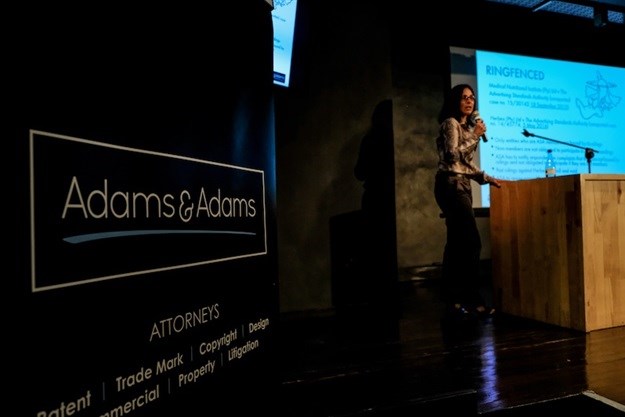Charné Le Roux, partner with Adams & Adams Cape Town, spoke at the first Global Advertising Lawyers' Alliance (GALA) event to be held on the continent about the South African Advertising Standards Authority's decline and the promise of its resurrection as an ombudsman.
While much of the afternoon’s presentations were funny as we laughed at the silly mistakes marketers make, it was also sobering to realise just how easy it is to get things wrong, and also how frequently this happens.
In the final presentation of the event, Le Roux spoke of the future of advertising regulation in SA. She explained that the Advertising Standard Authority (ASA) is an independent non-profit company that has self-regulated local advertising since 1969, guided by the Code of Advertising Practice. The local ‘ads police’, if you will.
Limited reach of the ads police
While ASA membership covers many marketing and communication bodies like the Association for Communication and Advertising (ACA), Cinemark, the Cosmetic Toiletry & Fragrance Association of South Africa, the Direct Marketing Association of South Africa, the Health Products Association of Southern Africa, the Consumer Goods Council of South Africa, the Industry Association for Responsible Alcohol Use, the Marketing Association of South Africa, the National Association of Broadcasters of South Africa, the Printing Industries Federation of South Africa the Pet Food Industry Association of Southern Africa and the Vacation Ownership Association of Southern Africa, membership has declined over past year. Some say it’s a dead duck, but Le Roux feels it is merely lame at the moment. Here’s why…
Le Roux said the ASA’s principles stand for advertising being legal, decent, honest and truthful, with a responsibility to the consumer and promoting fair competition in business. As a result its role should be that of ‘guard dog of reputation and confidence’ in advertising, to the industry and public alike. Its sanctions are diverse, ranging from the withdrawal of an advertisement to submitting a proposed amendment to the ACA for pre-publication advice, submitting all future advertising to the ACA for pre-clearing, publication of defaulter’s name, publishing a summarised version of the ruling, disciplinary hearings, or an Ad Alert notice being sent out telling parties to refuse all ads from the offender, which can be devastating. For example, view the below video interview from SABC News two years ago, of the ASA forcing Sanral to take down adverts deemed as "misleading and deceptive to the public", by giving inaccurate e-tag figures:
But Le Roux says the guard dog’s claws have been sheathed and its bark muted somewhat when it comes to jurisdiction, especially based on the law of contract. The Code applies to the advertiser, advertising practitioner and media owner alike, with Section 55 of the Electronics Communications Act stating that all broadcast service licensees must adhere to the ASA Code.
Unfortunately this has since been ring-fenced by the High Court cases against the ASA by Herbex in May 2016 and the Medical Nutrition Institute in September 2015. Both were based on the allegation that the statements advertised were untruthful or couldn’t be substantiated. The ASA was ordered to repay appeal fees to Herbex, making all past rulings against Herbex null and void. Now, only members of the ASA are bound by its rulings, making it understandably less attractive for membership as well as dimming its power as an adjudicator of ad disputes. That’s because non-members are not obligated to participate in ASA proceedings, with the ASA ordered to notify respondents in complaints that they’re not bound by rulings and that they’re not obligated to participate if they’re not members.
New life as an ombud?
Luckily, all is not lost as the Consumer Protection Act allows for ombudsman schemes. Le Roux says this has thrown the ASA a lifeline to potentially rise from the ashes like a phoenix. Through the scheme the ASA can now apply for accreditation, with their proposed Industry Code and request for accreditation published in July 2016. The public can also comment on the ASA’s process of applying for accreditation, then recommendations will be made to the Department of Trade and Industry. If accredited, the ASA will be recognised by statute as an authority of advertising.
The definition for participants in the industry code will thus include all marketing and advertising agencies, as well as media owners and buyers in the industry, including retailers, manufacturers and wholesalers. These will have to register with the ASA, fund it and be bound by its ruling in complying with industry code. That said, not all provisions or clauses of the ASA will be brought into the industry code, like those for intellectual property and imitation. The sanctions will also not be as severe as before, only extending to the ads in question being withdrawn or amended with the decision to do so published. If the sanctions are not complied with, the matters will be referred to the Competition Commission, indicating a procedural difference in the way competitor and consumer complaints will be resolved.
In summary, Le Roux says the ASA is well aligned to act as an ombudsman as it has years of experience in the field and functions well as an organisation. Consumers need to be protected but the ASA’s reach is currently curtailed. If accredited, it will no longer be considered a dead duck, rather a lame one.
Watch this space for further updates. Click here for a reminder of what three of GALA's global legal lawyers had to say about other advertising pitfalls to avoid, here for an overview of Adams & Adams Pretoria partner Dr Danie Strachan’s presentation on navigating the pitfalls of promotional competitions in South Africa and here for a gallery of the afternoon. If that’s not enough, follow Adams & Adams on Twitter.






































